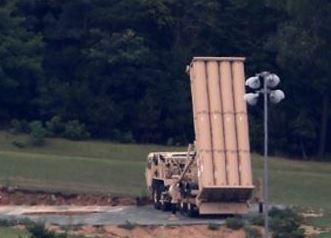Korea to conduct extensive environmental survey of THAAD
By Kim Min-jooPublished : July 28, 2017 - 10:44
The South Korean government said Friday that it will launch an additional environmental assessment of a US anti-missile system, virtually ruling out the possibility of its deployment being completed this year.
The deployment of all six launchers of the Terminal High Altitude Area Defense system is expected to be finalized next year after the environmental assessment aimed at securing procedural legitimacy, the Defense Ministry said.
Besides the two THAAD launchers already deployed in Seongju, North Gyeongsang Province, under the previous government, there are four additional ones in storage at the US Forces Korea base, pending an environmental review by Seoul.
But the assessment result will not change the fact that the US anti-missile system will be stationed as agreed by South Korea and the US, the ministry official stressed.
“The government’s stance is that it will not withdraw its plan to deploy THAAD,” the official said, adding the assessment will be done “as soon as possible.”

The regular environmental impact assessment takes 10 to 15 months, the ministry said, as it requires an inspection of the site in more detailed 21 categories and the process of gathering opinions from the public.
“The assessment period can be considerably shortened on the condition that various procedures smoothly proceed as a small-scale assessment was already done,” the official said.
The Environment Ministry has conducted a small-scale test on part of the THAAD deployment site -- 328,779 square meters of land -- since December under the previous administration. The small-scale evaluation omits the process of consulting with the public and takes about six months.
Seoul agreed to donate the land for the THAAD deployment in two stages: 328,779 square meters first and the remaining 370,000 square meters later, with a combined 700,000 square meters of land subject to the environmental assessment.
The Moon administration earlier said that the previous government might have offered only a part of the site to the US Forces Korea to avoid going through the regular environmental impact assessment to speed up the deployment of THAAD.
On a site smaller than 330,000 square meters, only a small-scale environmental test is required.
President Moon Jae-in ordered a thorough environmental inspection of the deployment site in June after the Defense Ministry failed to inform him that four more launchers for the US anti-missile system had been brought into the country.
The Defense Ministry said that it will allow the supply of fuel and extra construction to temporarily run the deployed launchers and facilities for soldiers stationed there.
It also said it will take proper measures for residents in the neighborhood near the deployment site, promising to hold public hearings and an inspection of the safety of the launchers if residents want.
The delay of the THAAD deployment will likely remain a thorny issue between South Korea and the US, amid continued tensions with North Korea over its ballistic missile and nuclear programs.
The allies initially agreed to finish stationing the US missile shield in Korea by the end of this year. The US has underscored the role of THAAD to counter growing threats from North Korea. It has stepped up its pressure on North Korea, with the US Senate on Thursday passing sanctions on the reclusive regime.
A local media outlet earlier reported that the US asked South Korea to finish deploying the anti-missile program by March at the latest during working-level consultations ahead of the Korea-US summit last month, but the presidential office denied the reports.
Chinese Foreign Minister spokesman Lu Kang said that China’s stance on the THAAD issue is consistent and clear, calling on South Korea and the US to stop the THAAD deployment.
China has objected to its installation, saying that the missile defense system and its radar system could be used to spy into its territory and undermine regional security.
The main opposition Liberty Korea Party and minor Bareun Party blasted the government’s decision, calling it “irresponsible.”
“The Defense Ministry stressing procedural legitimacy when our people’s lives are at stake just shows that its insensitivity to national security is out of control,” said Rep. Kim Young-woo of the minor conservative Bareun Party who chairs the defense committee in the National Assembly.
According to a Gallup Korea survey of 1,003 Koreans released on June 16, 53 percent of the 1,003 respondents were in favor of the stationing of THAAD, while 32 percent were against it.
Anti-THAAD activists and residents near the anti-missile battery deployment site strongly opposed the plan for the “regular” environmental test, saying the government should instead conduct a “strategic” assessment of the site.
The strategic environmental assessment looks into whether the project itself is appropriate, which in this case could signal the possible retraction of the THAAD deployment.
They have long protested the stationing of THAAD, citing worries over health and environmental risks from electromagnetic waves emitted by its AN/TPY-2 radar system, doubts over the effectiveness of the anti-missile system in protecting Koreans and Chinese economic retaliation.
By Ock Hyun-ju (laeticia.ock@heraldcorp.com)


![[Exclusive] Korean military set to ban iPhones over 'security' concerns](http://res.heraldm.com/phpwas/restmb_idxmake.php?idx=644&simg=/content/image/2024/04/23/20240423050599_0.jpg&u=20240423183955)

![[Graphic News] 77% of young Koreans still financially dependent](http://res.heraldm.com/phpwas/restmb_idxmake.php?idx=644&simg=/content/image/2024/04/22/20240422050762_0.gif&u=)



![[Pressure points] Leggings in public: Fashion statement or social faux pas?](http://res.heraldm.com/phpwas/restmb_idxmake.php?idx=644&simg=/content/image/2024/04/23/20240423050669_0.jpg&u=)









